 Petzlover
Petzlover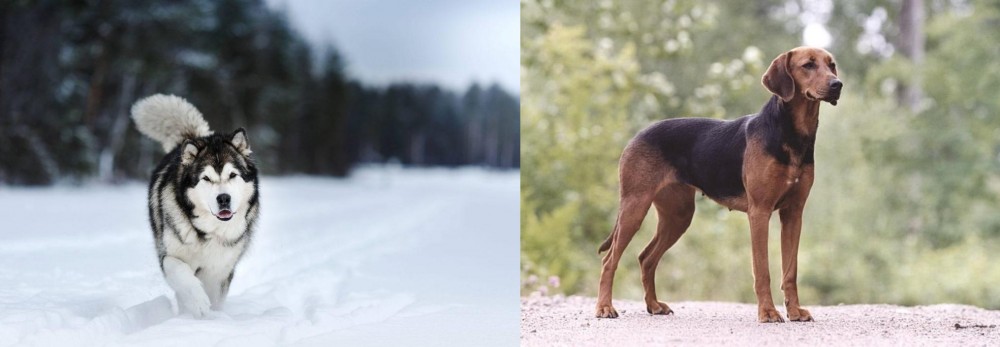 Siberian Husky is originated from Russia but Schillerstovare is originated from Sweden. Both Siberian Husky and Schillerstovare are having almost same height. Both Siberian Husky and Schillerstovare are having almost same weight. Both Siberian Husky and Schillerstovare has almost same life span. Both Siberian Husky and Schillerstovare has almost same litter size. Siberian Husky requires Moderate Maintenance. But Schillerstovare requires Low Maintenance
Siberian Husky is originated from Russia but Schillerstovare is originated from Sweden. Both Siberian Husky and Schillerstovare are having almost same height. Both Siberian Husky and Schillerstovare are having almost same weight. Both Siberian Husky and Schillerstovare has almost same life span. Both Siberian Husky and Schillerstovare has almost same litter size. Siberian Husky requires Moderate Maintenance. But Schillerstovare requires Low Maintenance
 Siberian Huskies are very close to Chukchi people.Chukchi is a tribe in Siberian nomads and huskies are beleived to be originated with them. DNA tests on huskies prove that they are the oldest among the dog breeds and they used them to travel fast. Also children used to sleep with them as they provide body heat to them. Siberian Huskies also like to be very close to the children. In 1908 at the gold rush, huskies were imported to Alaska and used as sled dogs. In Alaska they were used for dog sled race until today.
Siberian Huskies are very close to Chukchi people.Chukchi is a tribe in Siberian nomads and huskies are beleived to be originated with them. DNA tests on huskies prove that they are the oldest among the dog breeds and they used them to travel fast. Also children used to sleep with them as they provide body heat to them. Siberian Huskies also like to be very close to the children. In 1908 at the gold rush, huskies were imported to Alaska and used as sled dogs. In Alaska they were used for dog sled race until today.
Siberian Huskies were exported from Siberia and they continued their journey in North America. American kennel club recognized them in 1930 and the Siberian club of america has been founded in 1938.
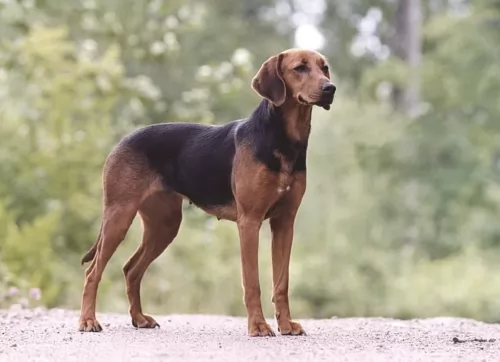 The Schillerstövare originated in Sweden, being named after a Swedish farmer, Per Schiller. After he died, the dog was named Schillerstövare in 1907, and was Sweden's first native dog breed.
The Schillerstövare originated in Sweden, being named after a Swedish farmer, Per Schiller. After he died, the dog was named Schillerstövare in 1907, and was Sweden's first native dog breed.
The Swedish Kennel Club recognised this dog in 1907 and it is also recognised by the Federation Cynologique Internationale as well as a number of minor kennels and dog clubs.
The dog has always been used as a hunting dog and the English Foxhound is the e foundation for this breed.
 Siberian Huskies are said to be one of the beautiful dog breeds in the world. They are well known for their thick coat and blue coloured eyes. Siberian Huskies are really challenging for new dog owners. It is preferred to give them a fenced yard and the fence should be sunk well to the ground to prevent them from escaping, as they always try to escape. They are medium sized working dogs having high energy level. Initially huskies were developed as sled dogs.
Siberian Huskies are said to be one of the beautiful dog breeds in the world. They are well known for their thick coat and blue coloured eyes. Siberian Huskies are really challenging for new dog owners. It is preferred to give them a fenced yard and the fence should be sunk well to the ground to prevent them from escaping, as they always try to escape. They are medium sized working dogs having high energy level. Initially huskies were developed as sled dogs.
They are affectionate and intelligent breed. Also they are independent in nature. They are kid friendly dogs and also are friendly with everyone including strangers. Siberian Huskies will be a good companion when given proper training and care. They are low shedders but it depends on the climate it lives. Normally they dont shed in cold climate but in warmer climate they will do. They shed heavily twice in a year for a three week strech. Normally Siberian Huskies do not suit well for apartment living. They are not watchdogs as they will bark very rarely but it enjoys to howl.
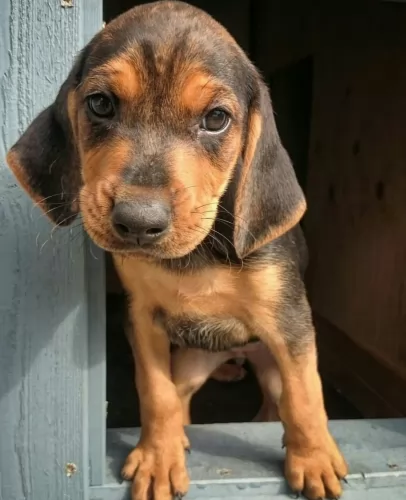 The Schillerstövare is a medium to large sized dog. They’re athletic and muscular.
The Schillerstövare is a medium to large sized dog. They’re athletic and muscular.
Standing at between 53–61cm in height and weighing in the region of 18–25kg, the coat of the dog is fairly short and harsh, with the color being black and tan.Sometimes you’ll see some white markings on the chest and paws.
The head is domed, the eyes brown, bright and alert and the ears of the dog are broad, medium length and floppy. The long tail is carried low or held out when running or alert.
If you allow your Schillerstovare to have puppies, you can expect between 3 to 7.
The Schillerstovare is a calm dog but he can get petty lively when there’s a game to be had. He gets on well with well disciplined children who have been taught to be kind and respectful to animals. He also gets on well with pets in the home. Just like with most other dogs, he will need to be trained and socialized as he is a strong willed, confident, dominant dog.
He is friendly and active but will be somewhat reserved around strangers.These dogs will require a lot of exercise and will need quite a bit of space too. They aren't well suited to small properties in the city. He will need a daily walk but also a chance to get off his leash and run free in the park. Other forms of exercise such as hikes, ball game and swimming will delight him.
 Siberian Huskies are very much affectionate with children. But it is necessary to train both parties to behave with each other. It is recommended to have an adult supervision for younger children.
Siberian Huskies are very much affectionate with children. But it is necessary to train both parties to behave with each other. It is recommended to have an adult supervision for younger children.
They are very good diggers and so they should be watched if they are in garden. They tolerate well in cold weather and mostly huskies can be seen in the area of snow falling. They are very good in pulling sledges.
They adapt well in cold weather. It is advised to give them a well fenced yard. They do not like apartment living. Also they do not like to be alone and if kept alone for long time they will disturb your house and make it dirty.
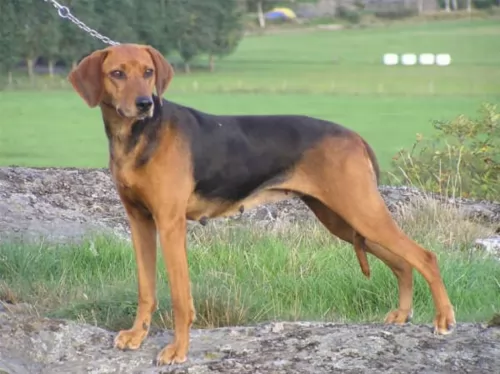 Schillerstovares are social, loving, friendly, loyal dogs who enjoy being around their human family. He’s going to need a lot of exercise, both mental and physical to keep him from boredom and frustration.
Schillerstovares are social, loving, friendly, loyal dogs who enjoy being around their human family. He’s going to need a lot of exercise, both mental and physical to keep him from boredom and frustration.
He will rely on you for at least a daily walk. He is strong-will and confident and will do well in a family where they are active and where they are firm, patient, kind and consistent in their behaviour towards him because then he ticks all th right boxes for being a splendid pet.
 Siberian husky suffers with minor health problems such as hypothyroidism, Progressive retinal atrophy and cataract. They are also prone to lose pigment in nose and muzzle. Some health problems occur due to bad breeding practices and some due to environmental problems where the puppy is brought up. They have also chances to get skin disease such as allergies.
Siberian husky suffers with minor health problems such as hypothyroidism, Progressive retinal atrophy and cataract. They are also prone to lose pigment in nose and muzzle. Some health problems occur due to bad breeding practices and some due to environmental problems where the puppy is brought up. They have also chances to get skin disease such as allergies.
When they are in the age of 2 to 5 years, they are having chances to hairloss due to Alopecia X. This condition mainly causes due to hair clipping in Siberians. They will be healthy but the hair will not grow in affected areas. Siberians are double coated and when the situation prevails the topcoat will fall off first and the undercoat follows it. The hair will fall off in both side of the dog in same area. Spaying or neutering will reduce such problems as it causes because of sex hormones.
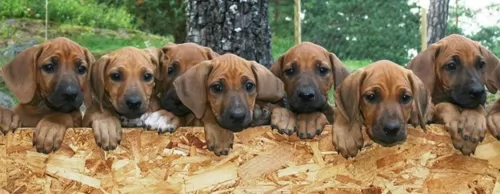 Even though your Schillerstovare is a healthy dog breed, hip dysplasia is a common dog disease that many dogs get.
Even though your Schillerstovare is a healthy dog breed, hip dysplasia is a common dog disease that many dogs get.
This is a skeletal disease when a dog’s hip joints become partially dislocated. It can be very difficult for your dog to get around, and he can also develop arthritis. It gets very sad when your dog doesn’t even want to participate in games anymore.
 In one method of feeding the Husky puppies, the food will be given always available, but this method is not recommended as it has some problems. This method is followed by large breeders because of lack of time to spend on individuals. Another method is to keep meal for 3 times a day. At about 12 to 16 weeks of age the meals can be reduced to two times a day. In this method the meal given should not be there after 15 minutes even if puppy did not ate. The important training for Husky puppies while eating is they should not growl when the food is taken by its master.
In one method of feeding the Husky puppies, the food will be given always available, but this method is not recommended as it has some problems. This method is followed by large breeders because of lack of time to spend on individuals. Another method is to keep meal for 3 times a day. At about 12 to 16 weeks of age the meals can be reduced to two times a day. In this method the meal given should not be there after 15 minutes even if puppy did not ate. The important training for Husky puppies while eating is they should not growl when the food is taken by its master.
Many Siberian experts don't like commercial dog food as they are sure that because of such foods dog may get problems like itching, dandruff, loose stools and hot spots. According to experts the good food for them are home cooked food from turkey, real chicken, beef and fish. Fruits and fresh vegetables are also very good for them. It is advised by dog owners to add only low salt or even without salt in their food. Also sugar is not good for them as it will bring some problems like hairfall and itching.
Siberian huskies can be easily groomed. Their eyes should be checked in puppyhood as they get chances to get eye problems and hereditary eye diseases. It is advised to make siberians to bath once in a year and they must be brushed once in a week. While brushing, the ears should be inspected and its teeth should be brushed. It is good to trim the long hairs in their feet and also nails should be trimmed slightly and very carefully as they have blood vessels there.
To give training and exercises to Siberian Huskies, the home should be prepared for them and it is better to make a fenced yard to prevent escapes. They have very high chances to escape and so the fence should be minimum 6 feet high and base should be strong as it should not break it or dig under to escape. Since they are active from their puppyhood they must be given lots of exercise. They should be socialized in their early stages as to get good behaviour and manners.
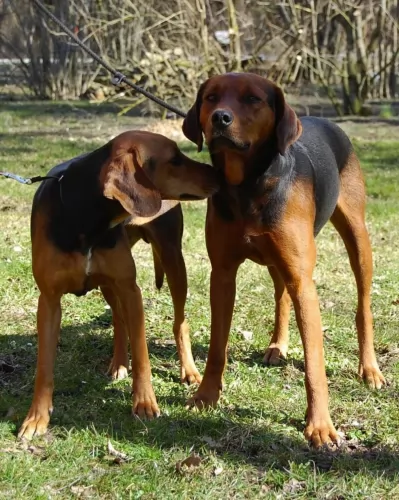 With his short coat, the Schillerstovare is considered a low maintenance dog and requires a minimal amount of grooming. Brushing should be done twice a week to remove loose hair. The harsh outer coat seems to repel dirt and dust.
With his short coat, the Schillerstovare is considered a low maintenance dog and requires a minimal amount of grooming. Brushing should be done twice a week to remove loose hair. The harsh outer coat seems to repel dirt and dust.
Trim your pet’s nails, check inside his ears for signs of redness, make sure his eyes are bright and clear and make sure he doesn’t have any unusual lumps on him.
Make sure his vaccines are up to date to avoid deadly canine diseases. Take him to the vet when you suspect he isn’t his normal self.
Dogs, just like humans, do well on good, nutritious diets. Feed a human lots of junk food and sweets and they’ll grow up to be obese and unhealthy. That's exactly how it is with dogs too. Some of the best commercially manufactured dog foods are convenient and they can be good if you look at the top brands. Look for ones that cater for your dog’s age, size, breed and activity levels. This dry kibble can be made more inviting for your pet when you include some homemade food.
Dogs just want simplicity so that they don’t battle with digestive problems. Boiled chicken, sweet potatoes, brown rice or pasta, carrots and spinach will be wonderful for him when you chop the food up and add it into the dry kibble twice a week. See his tail wag and his brown eyes light up when he smells this treat. Some raw meat added up occasionally will also contribute to your pet’s heath.
Make sure he is never without a constant supply of fresh, cool water.